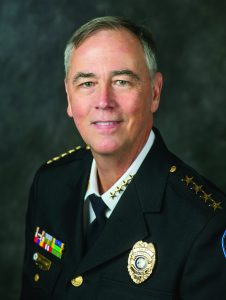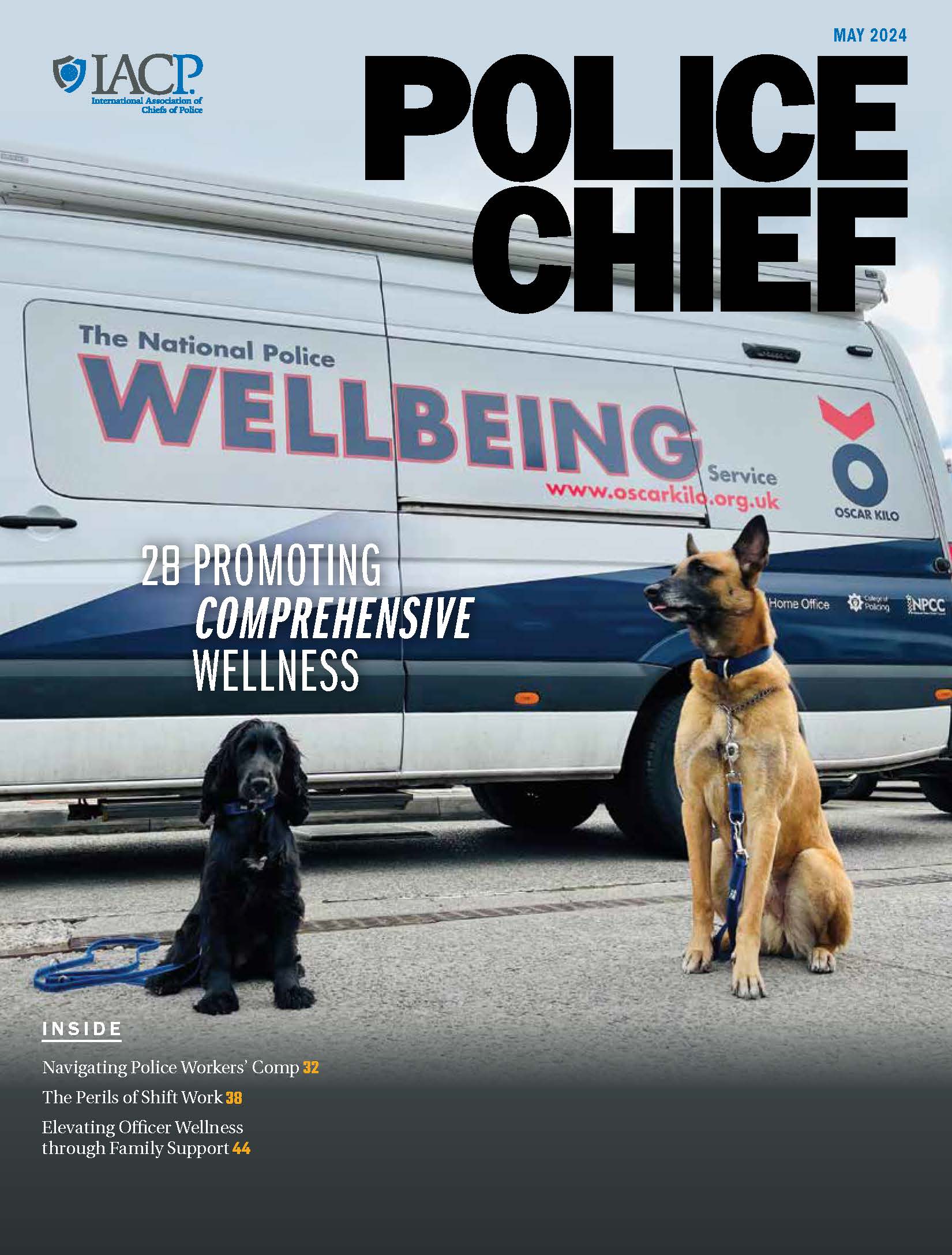
Just a few months ago, the world watched the body-worn camera footage of the heroic responding officers to the tragic and senseless shooting at the Covenant School in Nashville, Tennessee. These officers demonstrated remarkable courage by putting themselves directly in harm’s way, preventing further loss of life and protecting the innocent.
The valor that we witness daily—from large-scale acts like what happened in Nashville to the small everyday acts that truly embody our profession—is what gives all who wear the uniform that pride and sense of a higher calling to “serve and protect.” While our community members, the media, and others may not witness, acknowledge, or even know about these acts of courage, compassion, empathy, and strength of character unless they gain global attention, we know these events occur daily through the selfless service of law enforcement professionals. These moments where we protect and aid others are what truly define and inspire us as a profession.
While we all know that officers cannot falter when it comes to running toward danger, that only further emphasizes the point that, as police leaders, we need to ensure that we provide those in our charge with the proper training, equipment, safety, and health and wellness support services.
From the moment recruit officers enter the academy throughout their careers, police leaders have an obligation to ensure that officers are receiving continuous, effective training that will equip them to properly handle the dynamic environment that police officers face every day. Meeting this challenge is made increasingly difficult by the reality that public expectations, evolving crime trends, new tactical approaches, and changing laws can significantly impact how our agencies provide police services. It is clear that successfully meeting this challenge will take significant and constant investment, a resolute focus on continuous improvement, and an unyielding emphasis on how important regular training is to the safety of officers.
These moments where we protect and aid others are what truly define and inspire us as a profession.
While training and implementing safety measures, like ensuring our officers have the right equipment and technology, are more in our control as police executives, there are other elements and aspects of policing that require even more complicated techniques, solutions, and programs.
All of us know how police work can take a toll on an officer’s physical and mental health and well-being, and, as someone who has been in the profession for over 41 years, I have seen and witnessed this firsthand. From the long shifts and, on many occasions, forced overtime—heightened by the continual recruitment and retention crisis we are in—to the daily pressures of always having to perform at a higher standard, to experiencing and witnessing horrific events—just as those officers did in Nashville—our profession endures and expects so much more from its people than other careers.
This is all in addition to the role we serve as the face of public safety and the most visible arm of government in our communities. This, justly or unjustly, opens us up to enhanced scrutiny and, more often than not, false, unfair, or uninformed perceptions from the media, elected officials, and the public. Partly as a result of this negative narrative, officers are also subject to unjust violence. In 2020, 60,105 law enforcement officers in the United States were assaulted while on duty, an increase of 4,071 over 2019.1 Tragically, as of 2022, the National Law Enforcement Officers Memorial Wall in Washington, DC, contains 23,229 names, and another 556 will be added during National Police Week in 2023. While many of these officers gave their lives in service to their communities this past year, others who were previously lost to history from years past will also be honored during the 2023 ceremony. Honoring our fallen is a timeless responsibility, as is their service and sacrifice.
I have had the opportunity to attend activities during National Police Week in Washington, DC, many times, such as the Candlelight Vigil, 5K Memorial Run, Fraternal Order of Police remembrance ceremony, and others, and I recommend that every officer make it a point to attend these events or similar events in their own countries to honor the fallen at least once in their career.
This May, I am honored to be able to join other police leaders from across the United States during the Candlelight Vigil to read the names of fallen officers who will be added to the Memorial Wall in 2023 and forever remembered. I have also visited the memorial wall and museum during visits to the Washington, DC, area outside of National Police Week and find, in the quiet of the memorial grounds, a solemn opportunity to reflect, remember, and again thank those officers and their families, some of whom I have had the honor to work alongside, for their service and sacrifice. Whenever we have the opportunity, I and others from your Board of Directors have visited the memorials to fallen officers in many countries during our IACP official travels, to join in remembering the service of officers around the globe.
It is very important to remember our fallen, but, more importantly, we also need to do all we can to prevent attacks, assaults, life-endangering traffic incidents, and the events that lead to police suicide. Prevention comes from enhancing training, equipment, and procedures; developing and implementing wellness programs for our staff; and telling the positive story of our profession as we embrace a diverse workforce and enhance trust in our communities, while we also focus on enacting legislation to protect officers and hold accountable those who choose to target police.
The work of policing does not just affect our physical well-being, it also takes a toll on our mental health. In 2022, there were a total of 193 first responders who died by suicide—a deeply concerning trend that the IACP has focused on for several years.2 That number is far too high and goes to show that the threats our profession faces do not stop at the end of each shift. The effect of the job impacts every aspect of an officer’s life. Just as we protect ourselves and our fellow officers physically, we must do the same when it comes to mental well-being. No officer should feel they must suffer in silence. The National Consortium on Preventing Police Suicide Toolkit, spearheaded by the IACP, provides practical steps for police leaders to take to have a positive impact on this growing problem.3
Just as you would look out for your fellow officers in any tactical situation, we need to be cognizant about watching over our peers and noticing when something may be off or wrong and triaging that appropriately by having a conversation; recommending the officer speak to someone they are comfortable with; or involving peer support, an employee assistance program, or a chaplain. While not every agency can invest in a police chaplain or robust peer support program, knowing our people and being that supportive person for them can possibly make a significant difference. Your agency can also partner with another agency who has such a program, and you can use the many IACP wellness resources to assist your staff, both sworn and civilian.
I was recently afforded the opportunity to attend the IACP Officer Safety and Wellness Symposium, an event that began in 2019 with 300 attendees and has grown to 1,200 attendees in 2023, which clearly demonstrates the importance and emphasis the IACP places on officer safety in respect to mental health, physical health, and tactical safety.
As with most topics in policing, officer safety and wellness is a multifaceted issue, and addressing these various aspects requires effort from all of us. Rising to meet the needs of this noble profession means prioritizing our safety and personal well-being and that of our officers. This month, as we honor National Police Week in the United States, and throughout various times across the world, we honor and remember the service and sacrifice of all officers who have made the ultimate sacrifice. It is my hope that police leaders, with the collective assistance of community members and elected officials, can commit to doing all we can to protect the lives of the men and women who work tirelessly to protect the innocent, confront crime, and ensure the safety of our communities across the globe.d
Notes:
1FBI, “FBI Releases Statistics for Law Enforcement Officers Assaulted and Killed in the Line of Duty,” news release, October 22, 2021.
21st H.E.L.P., “Officer Suicide Statistics.”
3National Consortium on Preventing Police Suicide Toolkit (Alexandria, VA: IACP, 2021).
Please cite as:
John Letteney, “Protecting Our Profession & People,” President’s Message, Police Chief 90, no. 5 (2023): 6-7.


